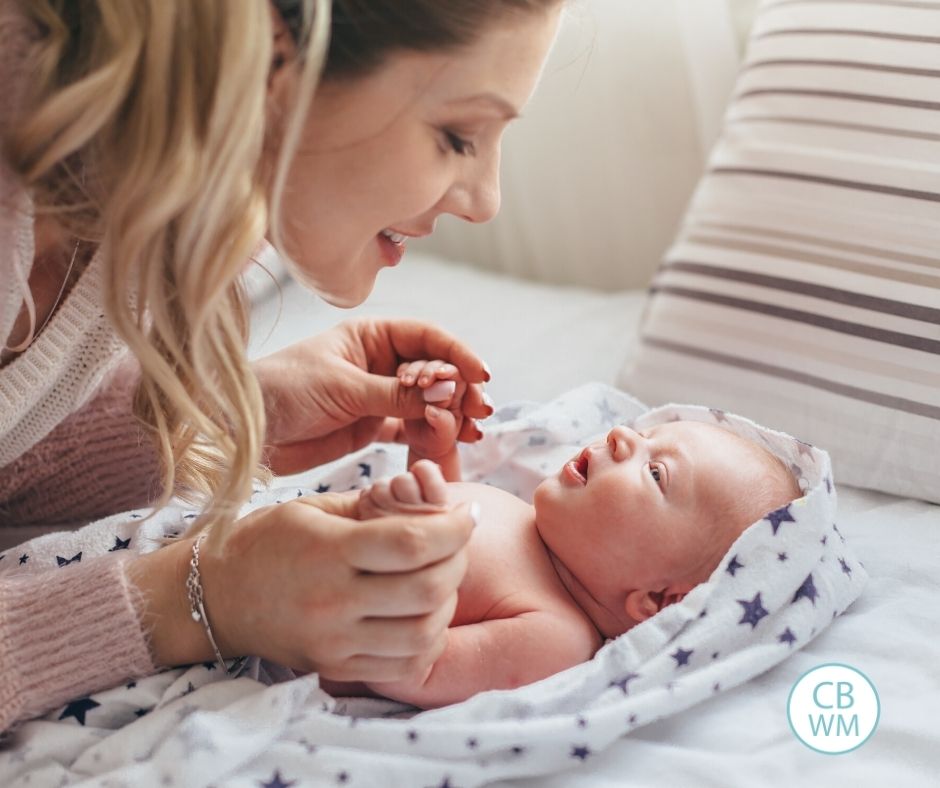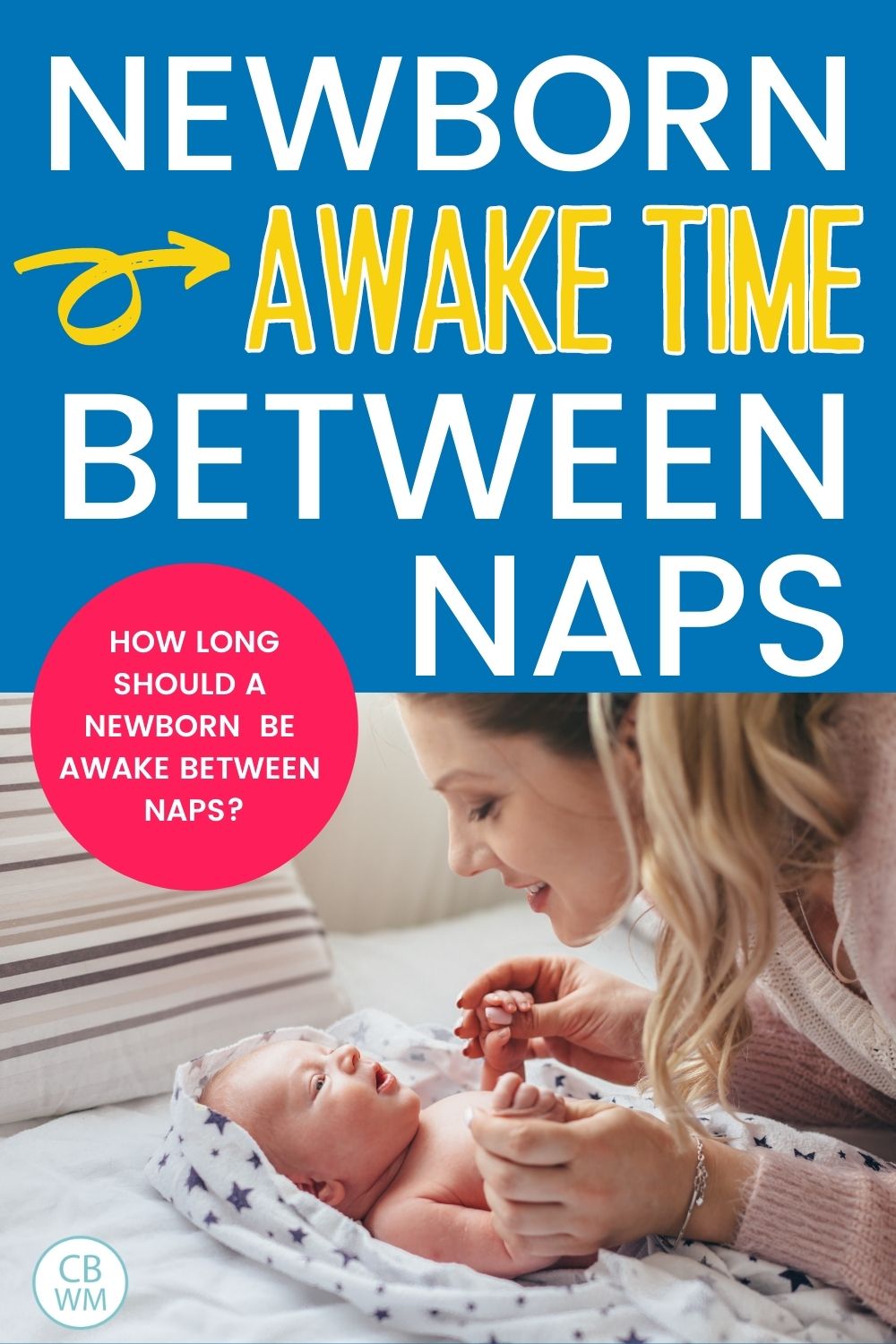Find out how long your newborn should stay awake between naps. Get awake time down perfectly and find out how many naps your newborn should take.

Finding your newborn’s ideal awake time is vital for getting a solid sleep schedule and make sure your baby is getting enough daytime sleep.
Figuring out the perfect waketime length is tricky. If you read through my newborn summaries with McKenna and Brinley, you will see that their waketime length changed and changed often. This is very common for baby sleep with newborn babies. So not only are you trying to figure out what is perfect, but you are trying to figure out where a target is that moves from day to day.
Post Contents
Where Do You Start?
When searching for that ideal awake time between naps, start with what is “normal” for “most” babies.
There is a reason most babies fit into a certain time frame–it is best for most of them. That means there is an excellent chance that is best for your baby.
Page 130 of On Becoming Babywise suggests 1-1.5 hours of waketime for your newborn. If you see my post on Optimal Waketime Length, you will see that 55% said 30-50 minutes was optimal for a 0-4 week old.
I found optimal awake time for a newborn to start out well below an hour. I shoot for 30-50 minutes. I then extend it as needed. As the baby gets older, waketime length will get longer.
Also, not every wake time length of the day will be the exact same.
Morning (the first of the day) is typically your shortest once baby is all settled in and on a predictable routine. Some babies will have the same wake time length all day long, others will vary.
When you are working to figure out waketime length, start by focusing on the first one of the day. Try different wake time lengths until your newborn falls asleep and sleeps well for naptime.
You will want to watch for signs of sleepiness (also known as sleep cues). Not all babies are helpful with sleep cues. Some do not show sleepy signs well, if at all, when they are tired. Sometimes the sleep cues actually mean baby is overly tired.
Some common sleep cues include fussiness, eye rubbing, and yawning. You can read about these and others in my Baby Sleep Cues post.
Once you have that awake time perfected, move on to the second one of the day. Start that one with the same length as your first, then adjust if needed.
Continue this process for each wake time in your daily schedule.
Writing this information down is very helpful to keep track of it all. I have a printable version of my Optimal Waketime Log that I used to see it all.
>>>Read: Newborn Routines: Sleep, Schedules, and Play
How Do You Evaluate Awake Time?
Awake time is the length of time baby is awake between each nap. As you are trying to find what is best for your baby, you will probably wonder what to look for. What are signs the length was good? What are signs it was not good?
Typically, if your newborn has a hard time falling asleep for a nap, she was up too long.
If she sleeps but wakes early from her nap (and it isn’t because of a growth spurt or some other reason), then it is also usually that the newborn was awake too long.
In most cases, if a newborn does not nap well, the newborn was up too long.
As your baby gets older, if she takes a long time to fall asleep but isn’t crying about it, then she was likely not up long enough.
>>>Read: How To Tell if Baby is Overtired vs. Undertired
Hitting A Moving Target
Once you nail waketime down, it will soon change. That is the hard news.
The good news is that the change is adding time. So at least once you have it down, you know to go up.
When you can tell that it is time for you to add time to your baby’s awake time, add it slowly. I add only five minutes at a time when I add until we get it right.
Nap Schedules
It is important to know your overall goal with how many naps your newborn should get in a day. The number of naps can vary a bit depending on how often baby eats.
Your baby should follow an eat/wake/sleep pattern each day. So baby gets up in the morning, eats breakfast, has some awake time (awake time does include feeding time), then takes a morning nap.
Then your baby will continue that cycle all day.
Your goal is for naps to be 1.5-2.5 hours long. The last nap of the day, typically the fourth nap, is often only a one hour nap, but not always. It can be as short as a 30 minute nap or as long as 2-2.5 hours long. If your newborn needs a short nap for that one, do not stress out about it.
Short naps are typically a sign that your baby’s awake time was not correct (although there are many things that affect how long nap will be; see the section below for more on that).
A typical newborn nap schedule will look like this:
7 AM-Eat
8AM-First nap
10 AM-Eat
11 AM-Second nap
1 PM-Eat
2 PM-Third nap (afternoon nap)
4 PM-Eat
5 PM-Fourth nap (evening nap–often a catnap)
7 PM-Eat
8 PM-Bedtime
10 PM-Dream feed
If your baby takes a catnap for the evening nap, you will have an earlier bedtime. Conversely, a little longer evening nap will lead to a later bedtime.
Take note that a newborn typically has 4 daytime naps. If your newborn eats more often in the day, then you could have 5 daytime naps.
What Else Is Important For Great Newborn Sleep
While getting wake time length down well is vital to successful newborn naps and nighttime sleep, there are many other important factors you need to be sure you are covering. You don’t want these factors waking baby up and leading you to falsely believe the waking is because of incorrect wake time length.
Swaddling
Swaddling is a great way to help your baby sleep well. It ensures baby will not wake up early because of the startle reflex. Swaddling your baby keeps your baby feeling cozy and comfortable, also. To read more about the importance of swaddling and how to be successful with it, see my post How to Help Your Baby Sleep Better with Swaddling.
White Noise
Using white noise will help your baby sleep better, also. This is especially true if you live in an area that is noisy or if you have other children. Read more in my post Benefits of White Noise for Baby Sleep.
Pacifier Use
The pacifier can be a helpful tool and it can also be a prop that prevents baby from sleeping well through the nap transitions. If your baby wakes up half way through the sleep cycle wanting a pacifier, then it is interfering with sleep more than it is helping it.
Comfort
Your newborn needs to be comfortable during sleep. The room temperature, how your baby is dressed, a clean diaper…these are all things that lead to baby being comfortable and sleeping well.
Sleep Routine
A solid sleep routine is very helpful in getting baby to sleep for long stretches for naps and for nighttime sleep. Your bedtime routine and night routine can vary from each other or they can be essentially the same.
Some good things to include are diaper change, swaddle, closing the blinds, starting your white noise, and reading stories. Once you have finished your routine, you put baby in the crib or bassinet for naptime or nighttime sleep.
Having a sleep routine helps set the stage and get baby in a perfect state for sleep, which helps baby sleep better.
Consistency
Consistency is often underrated. Have a super consistent morning wake up time and bedtime. This will help you establish a solid sleep schedule and get good sleep habits set up from the beginning. Young babies and old babies both need consistency, but young babies need it even more than older babies. Older babies can be more flexible.
Sicknesses and Medical Issues
If your baby is sick or has a medical condition like reflux, sleep will not be as solid. Reflux will make it so a baby cannot sleep as well, so if baby is not sleeping well and has a medical condition, that might lead to early wakings and it not be due to wake time length being off.
Sleep Regressions
Fortunately, there are sleep regressions during the newborn months, but it is good to be aware of them because sleep regressions are a real thing in future months. Your first is the 4 month sleep regression, so watch out for that one.
While there isn’t an official sleep regression, there is a witching hour. Not every baby has a witching hour, but for those who do, they will not sleep well. Witching hour can start at a few weeks old and can go until your baby is about a 3 month old. Read more about witching hour here.
Special Considerations
Many young newborns will not have a waketime every single waketime of the day. They will eat, then go right to sleep. That is okay. See Adding Waketime to Your Newborn’s Day. This will help you figure out how to get your baby to have a wake time each day.
Sometimes your baby will not sleep well because of overstimulation rather than simply needing a longer waketime length. See Overstimulation and Don’t Over Stimulate During Playtime.
Conclusion
To sum up, as you work to figure out optimal waketime length for your newborn, keep in mind that many do not stay awake after a feeding for every feeding of the day, and that is okay. Start by having a 30-50 minute waketime. As you add time, add only five minutes at a time.
Related Posts
- How To Accurately Calculate Baby Wake Time Length
- Adding Waketime to Your Newborn’s Day
- How to Calculate Waketime When Baby Wakes Early
- When and How to Extend Baby’s Wake Time Length
- Optimal Waketime Lengths
- Newborns and Waketime is a Slow Process
- Tips Know When it is Time to Extend Baby Awake Time
- Sleep Pressure for Babies

This post originally appeared on this blog October 2011
